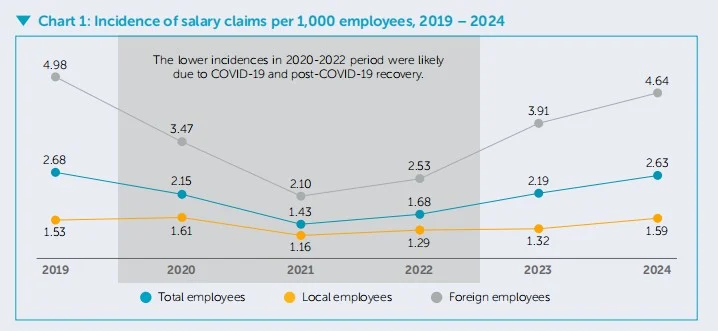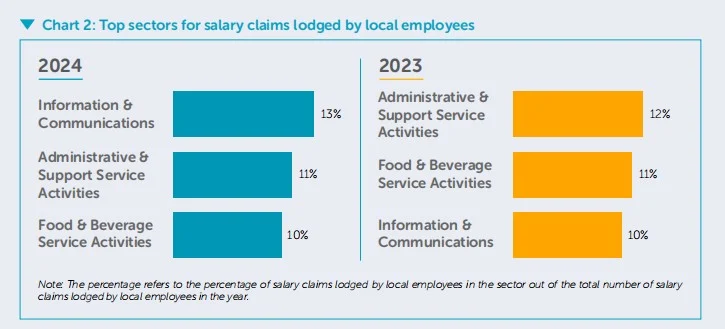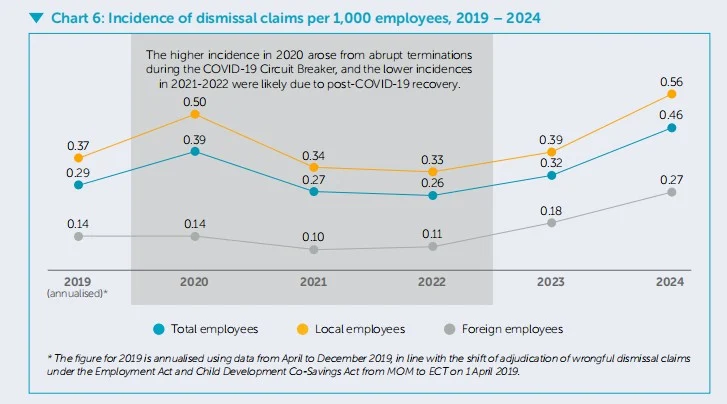Salary disputes hit five-year high as Singapore sees rise in employment claims in 2024
Employment disputes in Singapore surged in 2024, with salary claims reaching their highest level since 2019. Both local and foreign workers lodged more complaints amid rising business challenges and tighter labour conditions.

- MOM and TADM handled 11,685 employment claims and appeals in 2024 — nearly 2,000 more than the year before.
- Salary claims rose to 9,848, with employees recovering S$19 million in unpaid wages.
- Wrongful dismissal cases also climbed, alongside new laws to strengthen worker protections.
SINGAPORE: Singapore saw a sharp rise in employment disputes in 2024, with salary claims reaching their highest level since 2019.
The Ministry of Manpower (MOM) and the Tripartite Alliance for Dispute Management (TADM) reported 9,848 salary claims last year, translating to 2.63 claims per 1,000 employees — up from 2.19 in 2023.
This brought total employment-related claims and appeals to 11,685, nearly 2,000 more than the year before. The level was just below the pre-pandemic rate of 2.68 per 1,000 employees in 2019.
Employees recovered a total of S$19 million in unpaid wages through TADM and the Employment Claims Tribunals (ECT) — the highest sum in recent years.
Local and foreign employees see differing trends
Local employees made up 46 per cent of all claims, while foreign workers accounted for 54 per cent.
Among locals, the incidence rate rose from 1.32 per 1,000 workers in 2023 to 1.59 in 2024. Foreign employees, however, continued to face a much higher rate — climbing from 3.91 to 4.64 per 1,000.
MOM attributed this to persistent difficulties in sectors reliant on foreign labour, particularly construction, where many firms faced financial strain or liquidation.

Key sectors affected
Among local employees, the information and communications sector overtook other industries in 2024 to become the top contributor to salary claims.
MOM and TADM said that several firms in this sector faced cash flow issues, resulting in delayed or unpaid salaries. The sector accounted for 13 per cent of local claims, followed by administrative and support services (11 per cent) and food and beverage (10 per cent).

For foreign employees, the construction sector dominated, contributing nearly half of all cases at 47 per cent. Administrative support services and food and beverage each made up 9 per cent.
Nature of claims and resolution outcomes
For local employees, the most common claim items were basic salary, payment in lieu of notice, and compensation for unused annual leave.
Foreign employees mostly filed disputes over basic salary, overtime pay, and wages for work on rest days and public holidays.
The median claim amount for locals has risen in line with overall wage growth, while the typical duration of salary owed remained about one month’s pay. For foreign employees, the median claim duration fell to two months, from more than three months in 2019.
Nine in 10 salary claims were resolved at TADM in 2024 — slightly above the previous year’s 88 per cent. However, the average time taken to settle cases increased, with 13 per cent requiring between two and six months to conclude, up from 10 per cent in 2023.
Overall, 94 per cent of employees fully recovered their salaries through TADM and ECT, while another 4 per cent received partial recovery via settlements or bond insurance payouts.
MOM noted that fewer than 1 per cent of employers wilfully withheld salaries despite being able to pay. Such companies were barred from hiring or renewing work passes for foreign employees.
Rise in wrongful dismissal cases
Wrongful dismissal claims also increased, with 1,720 recorded in 2024 — translating to an incidence rate of 0.46 per 1,000 employees, up from 0.32 in 2023.
The rate was higher among locals (0.56 per 1,000) than foreign workers (0.27 per 1,000).

Of these cases, 71 per cent were resolved at TADM, while the remaining 29 per cent proceeded to the ECT. In 61 per cent of outcomes, employers were found to have met their obligations or cases were withdrawn. The remaining 39 per cent involved settlements such as goodwill payments or the issuance of certificates of service.
Employers paid a total of S$2.14 million in wrongful dismissal settlements in 2024 — up from S$1.72 million the year before.
Policy measures and legislative updates
In response to the evolving employment landscape, MOM rolled out several key reforms to strengthen worker protection and dispute resolution.
The Platform Workers Act, which took effect in January 2025, ensures Central Provident Fund (CPF) contributions, work injury compensation, and collective representation rights for self-employed delivery riders and drivers.
In December 2024, the Tripartite Guidelines on Flexible Work Arrangement Requests came into force, establishing a formal framework for employees to request flexible hours, remote work, or adjusted workloads.
Looking ahead, the Workplace Fairness Act, passed in January 2025, is expected to take effect by 2026 or 2027. It will outlaw workplace discrimination on grounds such as age, gender, race, religion, disability, and caregiving responsibilities.
MOM said the rise in employment disputes reflects both greater worker awareness of rights and ongoing economic challenges faced by employers.
“The tripartite partners remain committed to ensuring fair, timely, and effective resolution of employment disputes,” the ministry said. “Workers should continue to come forward early if salary or dismissal issues arise.”







